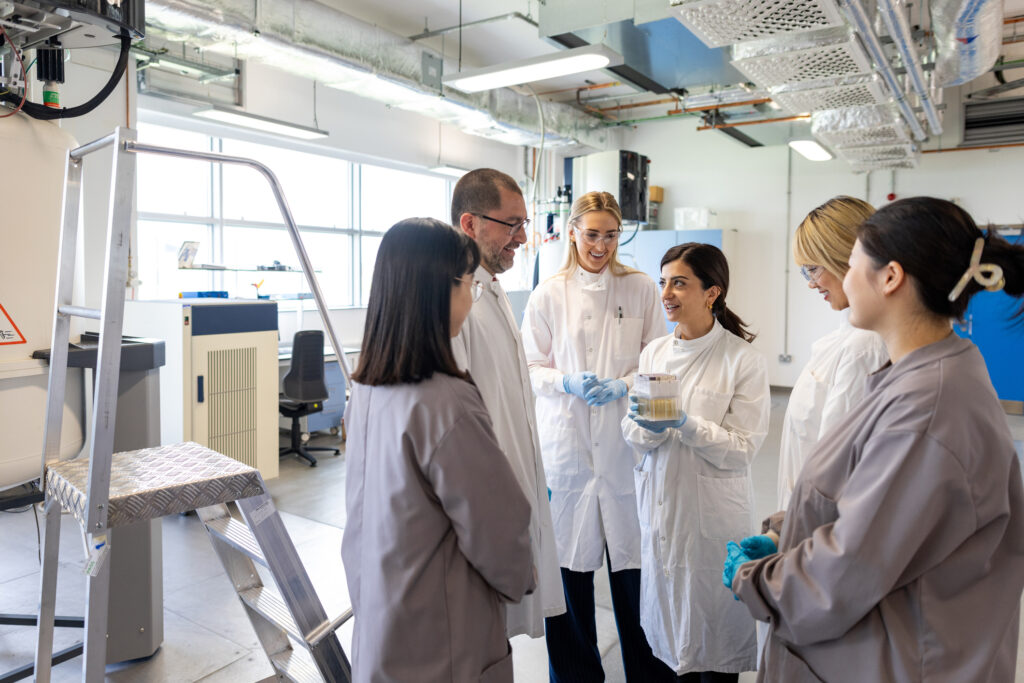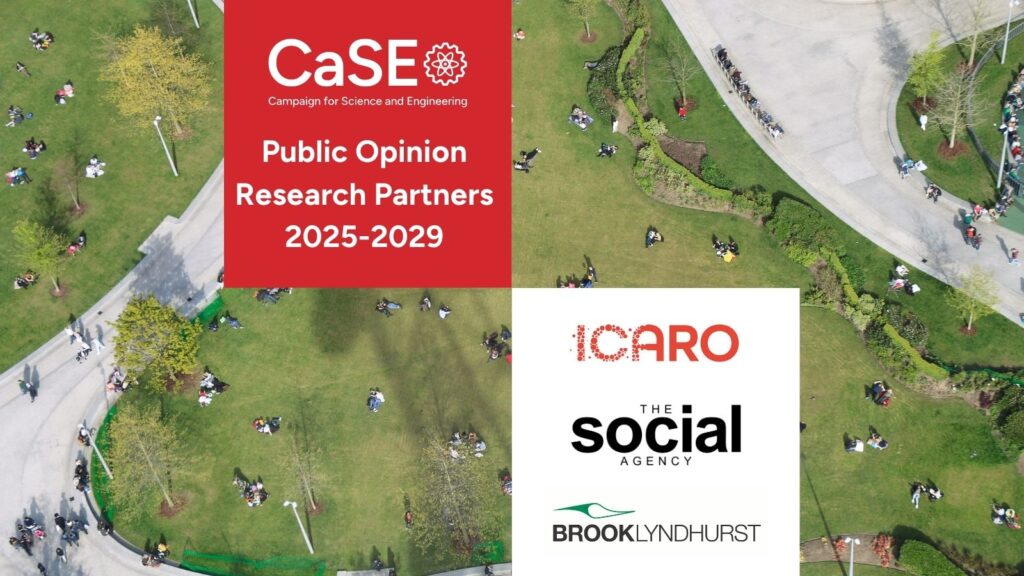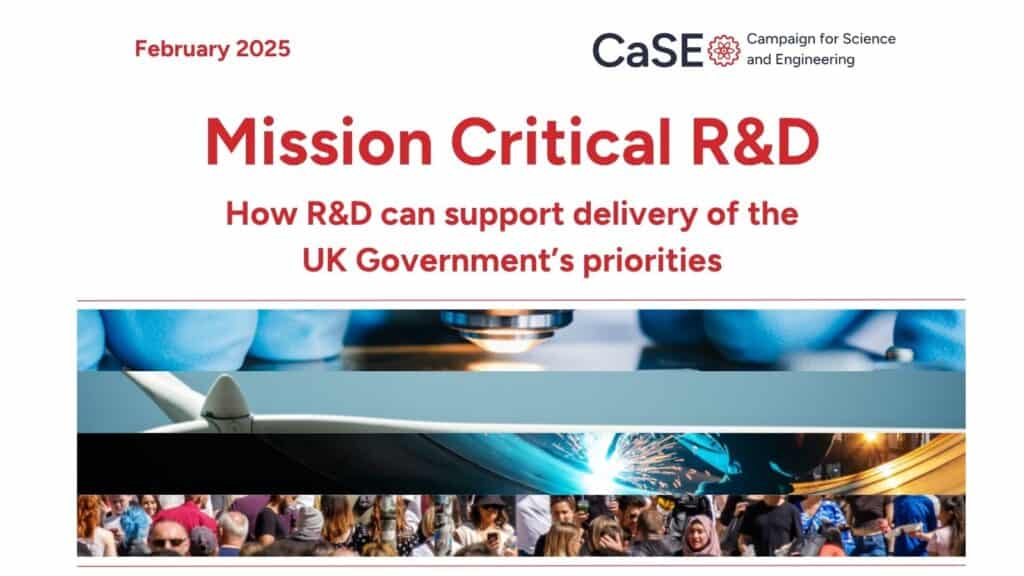“Many of the findings from CaSE’s latest research are positive – but the overriding message is one of caution. At times of political change, our sector needs public advocates more than ever. However, we cannot assume the public’s support when R&D and its benefits feel vague, intangible and removed from people’s everyday lives.
“To earn public support, our sector must build stronger and deeper connections with the public, offering transparency and genuine engagement, while making R&D feel more human, more local, and more relevant.”
“The UK political landscape is shifting, and our sector must collaborate to ensure a future with continued cross-party political buy-in to the value of R&D. Whatever lies ahead, widespread and deep public support for what our sector does will be crucial.
“As a sector, we also have a responsibility to show policymakers that R&D isn’t just economically a smart choice, it is also something that improves lives, sparks hope, and that people welcome into their community. The evidence-based insights CaSE has generated through this work can help us all prioritise and refine our advocacy.”
“The CaSE research employs a rigorous methodology, is comprehensive in its coverage, and is grounded in a genuine desire to understand public attitudes toward R&D.
“The findings show that R&D can feel distant, intangible and undertaken – in the words of one of the focus group participants – “in faceless buildings off the M4”. The R&D sector must become more tangible, more local and embrace the power of storytelling. In the current zeitgeist of pessimism and gloom, R&D needs to articulate how it can be a positive part of the solution.”
“This study reveals a timely set of findings. As politics becomes increasingly fragmented and budgets harder to balance, the best insurance policy for R&D is to deepen public connection to science by making it more meaningful, real and relevant to them.
“We have to be proactive, taking collective action to address the fragile support for R&D that CaSE have highlighted here, and engage the public in the opportunities of science. In doing so, we will demonstrate to politicians that investing in research is the route to creating better, healthier futures for everyone.”
Some stand out findings from across the research:
- Some 40% said they had heard of the term “R&D” and know what it means, rising to 82% when “research and development” is spelled out in full.
- Only around four in ten (41%) said that R&D was relevant to their life, and just 29% said they feel connected with R&D.
- Less than a third could immediately think of lots of ways R&D benefits the UK (29%) or their region (22%), falling to just 18% when asked about their local area or them and their family.
- Some 88% said it was at least somewhat important for the Government to invest money into R&D, and 71% think the Government should either increase or maintain levels of R&D investment.
- Two in three (67%) agreed R&D should be a tool to solve society’s problems, but there was a disconnect between some of the public’s priority issues and R&D’s perceived role in addressing them.
- If there was extra money to invest in R&D, a majority (86%) said that new medicines and treatments should be a priority, followed by cleaner energy sources (72%).
- More than seven in ten (71%) agreed that the private sector has an important role to play in UK R&D, although focus groups demonstrated some concerns about the profit-driven motivations of business R&D.
- Some 56% would support a new R&D laboratory in their local area, while 68% would support a new science museum or discovery centre. In focus groups, participants demonstrated a genuine appetite and excitement for both.
- There are high levels of trust in R&D voices to talk about how much money the Government should invest in R&D, at 80% for research charities, 74% for researchers and 72% for universities.
- A large majority said that they would trust information about R&D from research charities (84%), researchers (81%) and universities (77%).
- There are high levels of trust in R&D voices to talk about how much money the Government should invest in R&D, at 80% for research charities, 74% for researchers and 72% for universities.
- Across both trust questions, the least trusted groups were politicians, commentators on social media and journalists.
About this research
- CaSE Public Attitudes to R&D 2025 adopted a mixed methods approach, involving a large-scale survey of 8,000 UK adults alongside eight focus groups with 64 participants, with supplementary strands from the focus groups involving 12 follow up in-depth interviews and 12 participants taking part in some follow up video interviews. Full methods can be found in the attached report.
- All CaSE’s public opinion research is supported by a consortium of research agencies. This study’s questionnaire design, qualitative research and reporting was led by a team from Icaro, and quantitative fieldwork delivered by Deltapoll.
- The study explores baseline awareness and instinctive attitudes to benefits and investment, along with R&D’s role in solving problems and strengthening places. These themes, topics and questions have been informed by in-depth engagement with R&D advocates across disciplines and sectors.
- Supported by a grant from Wellcome, this study will be repeated every three years, with each combining combine large-scale polling with qualitative research.
About CaSE
Campaign for Science and Engineering (CaSE) is the leading independent voice for UK R&D.
We are a charity supported by a diverse membership including businesses, universities, professional bodies, research charities and individuals. Our members span the whole breadth of R&D – including discovery research, science, engineering, and innovation across the public, private, and charitable sectors.
We collaborate with our members, partners and the public to lend our clear, expert voice to decisions about research and development. We specialise in developing non-partisan, responsive solutions that help research and innovation to thrive in ways that improve people’s lives and livelihoods.
CaSE’s public opinion programme aims to generate insights and data-informed advocacy tools that can support a behaviour change in how our sector advocates for R&D, with the aim of making R&D matter to more people. This programme is supported by a £2.7m grant from Wellcome for 2024-29, building on CaSE’s 2021-24 Discovery Decade programme.




